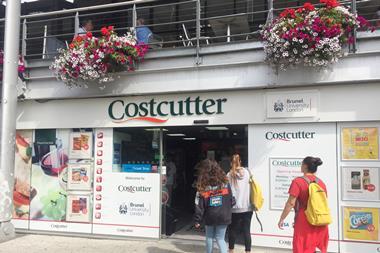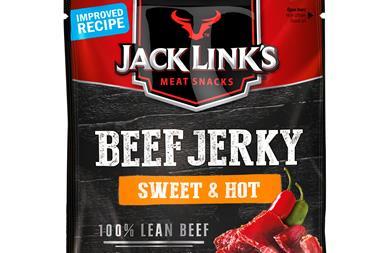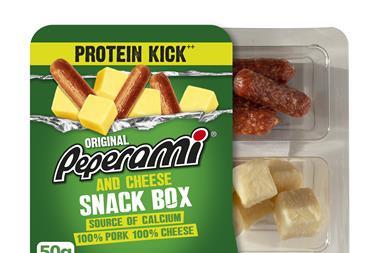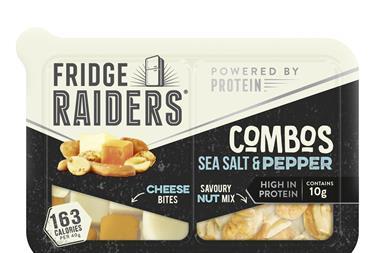The chiller continues to offer retailers electrifying sales, with ready meals, snacks and healthy lines among the strongest performers.
The UK convenience market is forecast to grow by 17.6% in value between now and 2023 (IGD, June 2018), with a significant amount of that growth likely to come from chilled foods.
Chilled is the top product category for the average c-store retailer, according to the ACS Local Shop Report 2017, accounting for almost 20% of sales (and climbing to more than 40% for some).
Alpesh Shingadia, of Budgens Southwater in West Sussex, knows how important chilled food is in his family’s store – the category makes up 28% of his total sales.
He says: “The category has been helped by sales of food to go and the interest in snacking. There are definitely a lot more seasonal and healthy alternatives moving into the chilled aisle, too.”
Raaj Chandarana, owner of Tara’s Londis in High Wycombe, Buckinghamshire, recognises that chilled foods is an opportunity –which is why he is expanding his chilled space.
“The convenience industry is moving more and more towards fresh and chilled so we want to make sure that we can offer the best range for our customers and take advantage by investing in our chilled range,” he says.
Ready meals, in particular, have become one of the most crucial categories within chilled. Julian Taylor-Green, owner of Spar Lindford in Hampshire, says customers now expect to come into a c-store and pick up a fresh ready meal for tonight’s dinner.
He says: “We are one of a select number of stores trialling Blakemore’s new Tonight’s Tea offer, which includes a main, two sides and a dessert for £9.50. At the moment, we are also running a promotion that gives customers a free bottle of wine with every meal deal.”
Blakemore’s Tonight’s Tea range features selections from Spar’s The Kitchen own label. Products are made using fresh ingredients and packaged without a cardboard backing. Julian thinks this gives them a premium feel.
He adds: “We have broad range of customers in our store, from older people to kids and their families, so we have to have chilled products that appeal to all of them. That’s why it is important for convenience stores like ours to offer a good range of quality ready meals.”
Alpesh agrees demand for ready meals has increased, and the quality has improved, too. He stocks multiple lines from Booker’s own-label Discover the Choice range.
“The Discover the Choice products are often on a mix-and-match offer, which is a really good promotion because it offers shoppers better value and allows them to choose their meals,” he says.
Alpesh also stocks some premium branded meals to give shoppers the option to trade up.
“The Charlie Bingham ready meals are selling very well. The amount of shoppers willing to spend more on meals for tonight has grown, which is why we are always looking to expand our chilled range,” he adds.
Julian, too, has noticed consumers trading up in the chiller, especially when they are purchasing meals for tonight. “Most shoppers are happy to pay more for the ability to eat something fresh that can also be made really quickly,” he reports.
Josie Chamberlain, manager of Costcutter Codicote in Hertfordshire, has started selling the Co-op’s own-label products. The range is being introduced into Nisa and Costcutter stores in stages over the next few months.
“We’re really excited about the products,” she says. “I think the range is a lot better quality than the old Independent range.”
Arnaud Leujou, manager of Costcutter Brunel University, London, agrees. He thinks the Co-op own brand has made his chiller more premium.
He says: “We have a two-and-a-half metre bay for chilled food so the main thing for us was to replace most lines with the Co-op label, keeping in mind the price point of each product.
“I think the products are something that consumers recognise and it will be interesting to see how quickly they adapt to Co-op’s ready meals and pizzas compared with the ones we had before.”
Merchandising Advice - Stay on top of shoppers’ needs
Angela Daulby, UK group sales director for Rustlers, believes retailers who focus on quality quick-cook lines can make the most of the opportunities in the chiller.
She says: “Retail is a competitive industry and it’s more important than ever that both brands and retailers stay relevant by adapting to shopper needs.”
Rustler’s brand owner Kepak recently worked with Sean Dhadday at Costcutter Fishley Lane, Walsall (pictured), with his wife Gurpreet, to bring his chilled convenience categories up to date. The firm helped re-merchandise micro-snacks, ready meals, sandwiches, pies and pastries.
Says Sean: “By making simple changes, such as merchandising chilled food to go products and ready meals on one bay, we’ve made it easier for our shoppers, reduced wastage and increased sales.”
Sean says he has been impressed with the results. “To increase overall sales by 39% across the categories exceeded my expectations.”
Snacking
With more consumers looking for chilled food to take away and one-fifth of households buying micro-snacking products such as Rustlers’ food-to-go range (Kantar WPO: 52 w/e 22 April 2018), snacking is fast-becoming a chilled category you shouldn’t ignore.
“Like ready meals, micro-snacking products are something that consumers now expect to see in a c-store,” says Julian. He adds that builders and the working trades who have microwaves on site make a beeline for such products.
Alpesh believes that protein snacks have had a similar effect on sales in the chiller. He says: “We’ve seen demand for chicken snacks that are high in protein such as Mattessons, GoGo’s and Fridge Raiders increase, and they have become a lot more popular with our shoppers.
“I think they work because they are healthy and are something that most people can eat on the move as an alternative snacking option.”
Pavan Chandra, marketing manager at Peperami and parent company Jack Link’s, agrees that the uptake of protein-rich snacks is big news in the chilled category.
He says: “With the role of protein having shifted from niche muscle building to having a broader, every-day appeal, meat snacking products such as Peperami have a role to play in the chilled category.
“Healthy eating has become embedded in the UK’s eating habits, resulting in an evolution of the chilled snacks consumers, with shoppers searching for healthier, high-protein options.”
Chandra adds: “With the health agenda having affected the UK’s eating habits, independent retailers need to ensure that chilled, high-protein snacks are prominently displayed.”
Anca Lazar, brand manager of Cathedral City Snacking, points out that healthy eating is contributing to the growth in high-protein lines such as cheese across the chilled and dairy category.
She says: “Consumers are becoming more mindful of the quality of calories, which means that naturally nutritious, protein-rich snacking products have become increasingly popular with shoppers,”
While cheese snacking may be on the rise, cheese blocks aren’t in as much in favour as they once were.
Amy Fisher, shopper marketing controller for Dairy Crest, points out that with many consumers time-stretched, it’s convenient products that are in demand. Sales of the traditional block have stagnated over recent years, she says, “while convenient formats such as sliced, grated and snacking products continue to drive good growth”.
Alpesh has noticed that sales of cheese snacks have been performing much better than big blocks. “The products that tend to do well are the ones that tie in with the food-to-go mission,” he says. “As a convenience store, people expect to come in and be able to grab what they want quickly, which is what makes cheese snacks more appealing.”
Cheese is still a staple for many of Julian’s customers, but he adds: “The bitesize cheeses, such as Babybel, are really appealing for youngsters and mums packing lunchboxes for school.”
Cathedral City goes big with latest launch
For those seeking perfection in a cheese sarnie, Dairy Crest may have the answer. The company has announced it is extending its Cathedral City sliced cheese range with the launch of The Big Slice.
The new larger, thicker Cheddar slices, made to fit a piece of bread perfectly, are designed to tap into consumer demand for convenience within the sliced cheese sector.
Natalie Cukierman, brand manager for Cathedral City Sliced & Grated, says: “Though convenience is a key purchase driver for sliced cheese, our research found that there was no product on the market that answered demand for ‘the perfect slice’ (of cheese) to cover a whole slice of bread.
“The Big Slice offers consumers a convenient and versatile cheese slice that fits bread perfectly, for cheese in every bite.
“With Cathedral City the only brand to offer this, we are confident that our latest innovation will provide shoppers with the perfect solution to their sandwich needs.”
The Big Slice will roll out later this year (rrp £2).
Drinks
Another category winner thanks to the appeal of protein-rich products is dairy drinks.
Mark Scannell, head of category at Danone Dairies UK, explains: “Dairy drinks that are high in protein are a key trend in the market. Although they are quite small in terms of value sales (£7.2m), they are growing fast at 12.9% year on year (IRI, 52 w/e 27 January 2018) and popular brands are targeting those with active lifestyles or the breakfast occasion,” he says.
Julian says Yazoo and Frijj continue to sell well for him. “They are quite price driven so when they are on offer they tend to sell in far greater numbers.
“I think they appeal because they come in larger bottles than regular soft drinks and can still be enjoyed out and about to keep people cool.”
Julie Stevens, category controller for Alpro UK and Ireland, points out that convenience retailers should ensure plant-based food and drink options sit alongside more established chilled lines to help drive sales.
“Retailers have a great opportunity to benefit from the fact that plant-based shoppers in this sector typically have a 40% higher basket spend than other customers (Nielsen, 2018),” she says.
Stevens believes c-stores should signpost plant-based products as healthy options, rather than categorising them solely as ‘free from’.
She adds: “This will mean that they appeal to people who are looking to make healthy choices day to day – rather than because of a specific dietary requirement such as an allergy or an intolerance.”
With shoppers already leaning towards fresh and chilled products thanks to healthy eating, store owners who keep up with the trends look set to be on to a winner.



























No comments yet